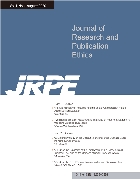 E-ISSN : 2733-7146
E-ISSN : 2733-7146
Vol.1 No.2
Abstract
Purpose: The purpose of this paper is to identify the most common misconducts in publication ethics, to demonstrate KODISA journals' management of the misconducts, and to share the findings with future and potential authors of Journal of Research and Publication Ethics (JRPE). Research design, data and methodology: This is an analytical study that explores and examines research and publication ethics and misconducts. Results: Based on literature review, major publication misconducts that many academic journals had to contend with over the years encompass unethical authorship, including ghost, guest, and gift authorships, data falsification and fabrication, plagiarism, including self-plagiarism, submission and publication fraud (multiple submission and publication), and potential conflicts of interest. Conclusions: KODISA and its journals have strived and done great work in making the journals transparent and in combatting the issues associated with plagiarism, including self-plagiarism. However, it seems there is no mechanism to detect or deter unethical authorship, conflicts of interest, and fabrication and falsification misconducts. The inception of JRPE signifies how KODISA and its journals continuously view research and publication ethics as their foremost important factor in maintaining and improving the academic journals. The future research and scholastic manuscripts of JRPE could provide necessary and updated information about research and publication ethics, practices, and misconducts.
Abstract
Purpose: The experience by a researcher highlighted steps is guided by a specific ethical codes of conduct. The purpose of the current study is to discuss the fabrication and falsification of data as the key ethical misconduct committed by many researchers focus on their causes and impact in the research field. Research design, data and methodology: To obtain suitable textual resource, the current study used content analysis to closely take a look at the fabrication and falsification based on prior research in the realm of publication ethics. As a result, the current authors could collect and understand adequate textual data from appropriate prior resources. Results: The Research misconduct is a common practice in different countries across the world. Based on the findings from this study, data fabrication or falsification have a grievous impact on all the stakeholders of a study. The unethical behavior affects the parties concerned both psychologically and financially. Conclusions: It is, therefore, recommended that researchers should be held accountable. This can be done through different means, including raising awareness of vulnerability to data fabrication and falsification. The government and research institute should also advocate for effective policies guiding research studies across the world.
Abstract
Purpose: The author wants to specify scope of research, identify without giving burden, prevent unfair identification of the author, admit of production of the outcome, enact rules of identification, and build up foundation of development. Also, this study defines scope of publication of outcome of research to prevent unfair identification of authors and admit of them. Research design, data and methodology: The study described literary research, standard research, phenomenon research, and empirical result without methodologies, statistical analysis and scientific test and investigated operation system of KODISA cases. Results: At publication of findings of the research, researchers shall identify the ones of production of the finding to allocate help of the research. Conclusions: Scientific journals shall be controlled to develop ability and to grow up and have a system. Researchers shall give direction of other scientific journals. The study made efforts to be a model. KODISA Edition Team shall make an effort to keep and develop. So far, no regulation of identification of authors has produced disturbance so terminologies should be uniformed. Researchers shall keep rules of identification of authors to uniform and regulate identification of authors, conditions of authors, and order and correspondent authors. KODISA enacted rules of identification of authors for the first time in Korea to develop science.
Abstract
Purpose: The purpose of this paper is to examine the ethical considerations that must be addressed in journals and discern the strategies that will elevate the quality of the journals. Research design, data, and methodology: This study utilized the past studies that were conducted in this field. Examples of journals were used to mark some of the key features of reputable journals, as well as the guidelines for KODISA. Results: This study has showed the importance of ethical considerations in journals for the best interests of the scholars and journal community as a whole. A clear set of outlines makes the journal a place for scholars to share their knowledge, as well as elevate the journal into a good standing in the academic world. Some of the key strategies in improving KODISA include inviting notable members of a field to share their knowledge and encouraging more scholars to contribute to this network. Conclusion: KODISA has a strong set of ethical considerations for the scholars that publish in their journals and will continue to improve its quality for the future. It includes improving its strategies and keeping up to date with the trends in the current field of discipline.













